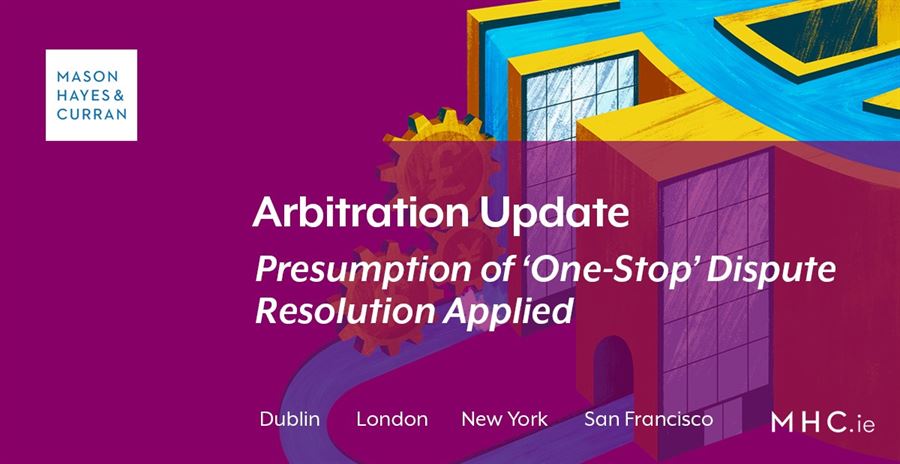
In K&J Townmore Construction Limited v Kildare and Wicklow Education and Training Board[1] the High Court stayed proceedings issued by a building contractor (the Contractor) against an employer (the Board) to arbitration.
Background
The Board entered into a Public Works Contract with the Contractor for construction works at a school in County Kildare. The Contractor claimed that it was owed money for these works and issued summary proceedings against the Board.
The Board sought to stay the proceedings to arbitration under the UNCITRAL Model Law, which was incorporated into Irish law by the Arbitration Act 2010. Article 8 of the Model Law requires a Court to refer the parties to arbitration unless the arbitration agreement is found to be null and void, inoperative or incapable of being performed.
The arbitration agreement
Clause 13.2 of the Public Works Contract contains an arbitration agreement. It provides that any dispute ‘under the contract’ will be finally settled by arbitration if not first resolved in conciliation. The Contractor argued that its claim was outside the scope of the arbitration agreement. It contended that its claim did not arise ‘under the contract’ but instead pursuant a separate agreement it had reached with the Board over the final account.
Interpreting arbitration agreements
Mr Justice Barniville found that when interpreting an arbitration agreement, the Court must assume that the parties intended for all disputes to be resolved in one dispute forum. The agreement will be construed broadly and this presumption will apply unless the parties use clear words to exclude certain types of dispute from the scope of their arbitration agreement. Established by the House of Lords in Fiona Trust & Holding Corporation & Ors v Privalov & Ors[2], this presumption of ‘one-stop’ dispute resolution is now routinely applied by the Irish Courts.[3]
Judgment of the court
Mr Justice Barniville determined that the Contractor’s claim was inextricably linked with the Public Works Contract. Both parties had entered into the contract and works were executed under that contract for which the Contractor was now claiming payment. The parties’ dispute was within the scope of the arbitration agreement. Article 8 of the Model Law therefore required the Court to refer the parties to arbitration.
Conclusion
This judgment is a comprehensive statement of the law which shows significant consistency in the approach now taken by the Irish Courts in Article 8 applications.
By routinely holding that Article 8 is mandatory and not discretionary, and by adopting a broad approach to the interpretation of arbitration agreements, including a presumption in favour of ‘one-stop’ dispute resolution, it is clear that the Irish Courts continue to support arbitration by holding parties to their bargain where an arbitration agreement exists.
For more information on successfully resolving similar disputes, contact a member of our Construction team.
The content of this article is provided for information purposes only and does not constitute legal or other advice.
[1] [2018] IEHC 770.
[2] [2007] 4 All ER 951.
[3] See BAM Building Limited v UCD Property Development Company Limited [2016] IEHC 582; Kellys of Fantane (Concrete) Limited (In Receivership) v Bowen Construction Limited (In Receivership) [2017] IEHC 357; Achill Sheltered Housing Association CLG v Dooniver Plant Hire Limited [2018] IEHC 6.






